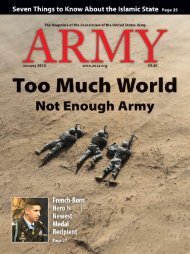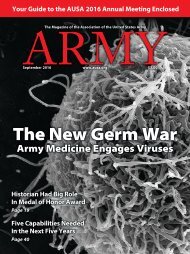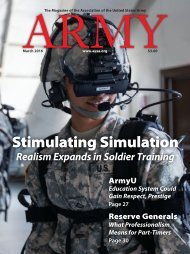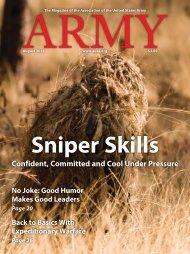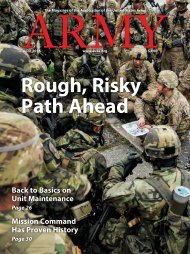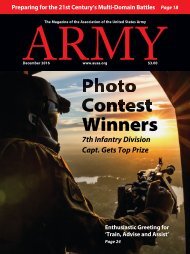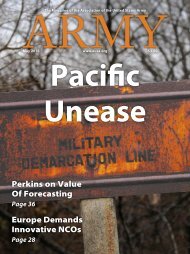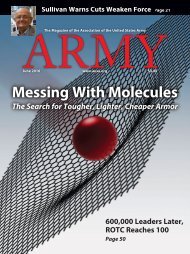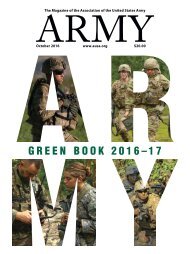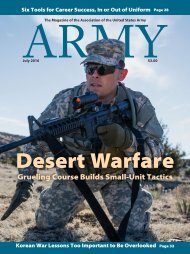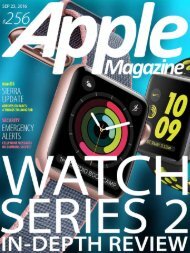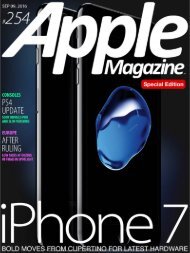Army - Kicking Tires On Jltv
You also want an ePaper? Increase the reach of your titles
YUMPU automatically turns print PDFs into web optimized ePapers that Google loves.
He’s the <strong>Army</strong><br />
Surgeon Will Serve ‘As Long as I Can’<br />
Dr. Frederick Lough had been out of uniform for more<br />
than a decade at the time of the Sept. 11, 2001, terrorist<br />
attacks. The former <strong>Army</strong> lieutenant<br />
colonel had served for 17 years before<br />
separating to pursue a civilian career<br />
as a heart surgeon. Still, in the weeks<br />
and months following 9/11, he felt the<br />
urge to do more for his country.<br />
So he did just that. Lough joined<br />
the <strong>Army</strong> Reserve in 2007; two years<br />
later, he was promoted to colonel. And<br />
in 2013, at the age of 64, Lough returned<br />
to active duty.<br />
“When I looked at my life, the <strong>Army</strong><br />
had been everything to me,” Lough<br />
said. “They educated me through college,<br />
through being a surgeon. … With<br />
the fights going on in Iraq and Afghanistan<br />
and the casualties coming, I<br />
felt that I just could not stand on the<br />
sidelines.”<br />
Lough grew up in a military family;<br />
his father was a career <strong>Army</strong> officer<br />
who served for four decades. The family<br />
moved frequently until finally settling<br />
down near the U.S. Military<br />
Col. (Dr.) Frederick Lough<br />
Academy. Naturally, Lough said, a military career seemed like<br />
a perfect fit.<br />
Lough graduated from West Point in 1970 and then served<br />
as an engineer officer with the U.S. <strong>Army</strong> Corps of Engineers.<br />
A few years later, he turned his attention to medical school.<br />
Although the Uniformed Services University of the Health<br />
Sciences (USUHS) did not exist at the time, there was a<br />
scholarship program for <strong>Army</strong> officers to attend civilian medical<br />
schools. Lough was accepted into the program and went<br />
on to graduate from George Washington University’s School<br />
of Medicine and Health Sciences in Washington, D.C.<br />
After completing residencies in general surgery and thoracic<br />
and cardiovascular surgery at what’s now Walter Reed National<br />
Military Medical Center in Bethesda, Md., Lough remained<br />
at Walter Reed as a general surgeon. As time went on,<br />
he served in Korea and came back to continue his training at<br />
Walter Reed.<br />
As Lough approached 17 years of service, he received a call<br />
from a former military surgeon asking him to join a practice in<br />
Pennsylvania. Lough separated from the <strong>Army</strong> and as a civilian<br />
surgeon, continued perfecting his craft, performing thousands<br />
of surgeries.<br />
By the early 2000s, with the wars in Afghanistan and Iraq going<br />
full force, Lough felt an obligation to get back to the <strong>Army</strong><br />
and be involved again. He worked with medical recruiters and<br />
about six years after 9/11, joined the<br />
<strong>Army</strong> Reserve. In 2010, he was deployed<br />
for three months to far western<br />
Afghanistan, where he led a group of<br />
U.S. doctors working alongside Bulgarian<br />
surgeons at a Spanish-run NATO<br />
hospital.<br />
“We were the first American group<br />
of physicians to be in this non-Englishspeaking<br />
NATO hospital,” Lough said.<br />
Despite the language barrier and different<br />
styles of medical care, Lough and<br />
his colleagues made it work. “It was a<br />
great challenge, but it was also very<br />
stimulating; fun, in a certain way,” he<br />
said. “Every day was a new, ‘OK, how<br />
do we do this?’ and at the same time,<br />
we’re getting combat casualties in who<br />
are, in some cases, severely wounded<br />
and you have to negotiate with other<br />
people how to do things. It required a<br />
lot of mental agility.”<br />
Lough deployed in 2012 to another<br />
area in Afghanistan, where he faced a<br />
much higher volume of combat casualties.<br />
“I felt like I was dealing with situations that were why I became<br />
a doctor in the first place,” he said. “Someone would be<br />
hurt and the only question was, what was wrong and could<br />
you help them and could you make them better.”<br />
“It was great that the people that I worked with were totally<br />
dedicated to trying to make this soldier better,” he said. “It<br />
didn’t matter whether the soldier was an American soldier, an<br />
Afghan soldier or a Spanish soldier—or whatever nationality.<br />
Everybody did everything they could. So it really was, from a<br />
physician standpoint, just spectacular because you really were<br />
doing your craft. You were really working as a surgeon to take<br />
care of things.”<br />
After returning home from his second deployment, Lough<br />
requested to return to active duty full time and in 2013, he was<br />
officially welcomed to the surgery department at USUHS in<br />
Bethesda. Today, he continues his work as a surgeon, professor<br />
and mentor.<br />
“The privilege and the opportunity to serve is so precious<br />
that every day is a gift,” Lough said. “I am really benefited by<br />
working at the great medical school here … and with great<br />
people. It is no question that I’ll keep going as long as I can.”<br />
—Jennifer Benitz<br />
Uniformed Services University of the Health Sciences/Sharon Holland<br />
February 2016 ■ ARMY 17




